#Mounia Akl
Explore tagged Tumblr posts
Photo
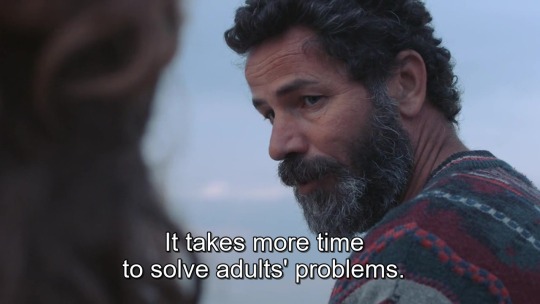


كوستا برافا، لبنان [Costa Brava, Lebanon] (Mounia Akl, 2021)
#كوستا برافا، لبنان#Mounia Akl#drama film#Clara Roquet#Beirut#Costa Brava Lebanon#Nadine Labaki#Saleh Bakri#city dump#Kūstā Brāfā Lubnān#pollution#landfill#family#grandmother#middle east cinema#harmony#parents#countryside#love#middle east societies#environment#friends#music#ecology#self-sustaining#swimming pool#rural life#teenagers#MENA#nostalgia
631 notes
·
View notes
Text
0 notes
Text
Costa Brava, Lebanon (Mounia Akl, 2023)
a lot of other reviews being reminded of Captain Fantastic so I will be too, and also of Running on Empty, which ruminates on, for me, similar themes. all three do something that troubles me. they flip one set of associations - women with nature/primordial, men with culture/civilizational, in favour of another set - women with community - the state, nationally/internationally, and so broadly, the social, and men with misanthropy and running away from society, which exists as a site of injury/originary trauma. the youngest daughter (so the one least 'contaminated' let's say, rudely, most uncharitably, with this social, and so closest to the state of nature) sides with her father. this is depicted neither reasonably nor unreasonably but it nevertheless reminded me of some pithy excerpt (on twitter? a screenshot? idk) of someone who used to meet her father's eye during moments of mutual commiseration over the unreasonableness of her mother until one day she realized that in the gender war, the role of Daughter is a temporary state of grace that only momentarily exists until the one day she is forever cast as Unreasonable Mother
I'm being reminded of all this and it's troubling bc I get the sense these narratives (Captain Fantastic, Costa Brava, Running on Empty) is pushing me towards Actually It is the Father who is unreasonable and unrealistic and I bristle. first I bristle at whether it is in fact unreasonable, then I bristle as society/the social being a site of injury and trauma for Men, and finally I bristle at the fact that all the women in these stories for whom society/the social may have conceivably been a site of injury and trauma are dead! the wife of captain fantastic, the grandmother here, and - a moment's digression for another favourite Lumet movie, a duology I think, to Running On Empty: Daniel, in which post catastrophe, the Brother flinches at rejection and desires conformity and the return to social acceptance while the Sister rejects it all. and both parents had been ejected from it. but she kills herself! but the state had killed their parents!
[source: stream]
0 notes
Text
Clara Roquet
Nacimiento: 30 de diciembre de 1988 (34 años) Malla (España).
Nacionalidad: España

Clara Roquet es una guionista y directora de cine española.
Entre sus proyectos más recientes como guionista destacan el primer largometraje de la directora libanesa Mounia Akl, Costa Brava, seleccionado para la Cinéfondation Résidence 2017 de Cannes.
Tambien fue premiada en los premios Goya de 2021 como Mejor direción novel en la pelicula Libertad.
Y tambien fue premiada en los premios Gaudí de 2022 como mejor guion.
0 notes
Link
0 notes
Photo




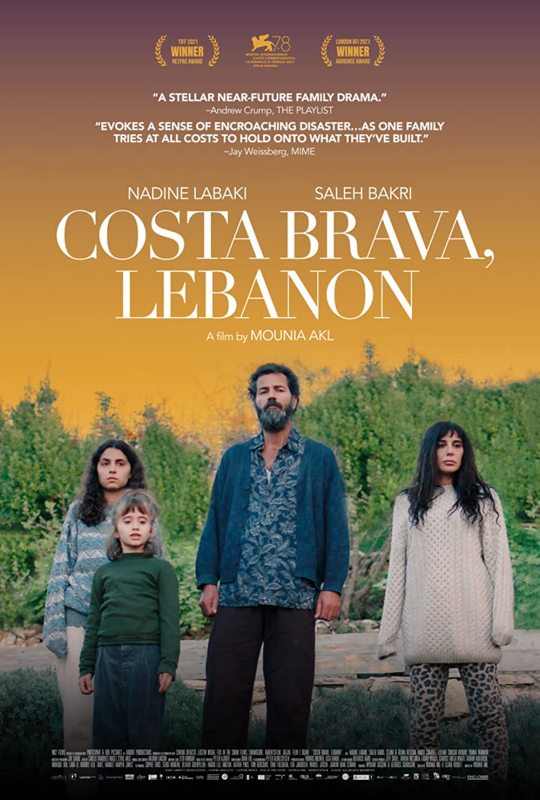
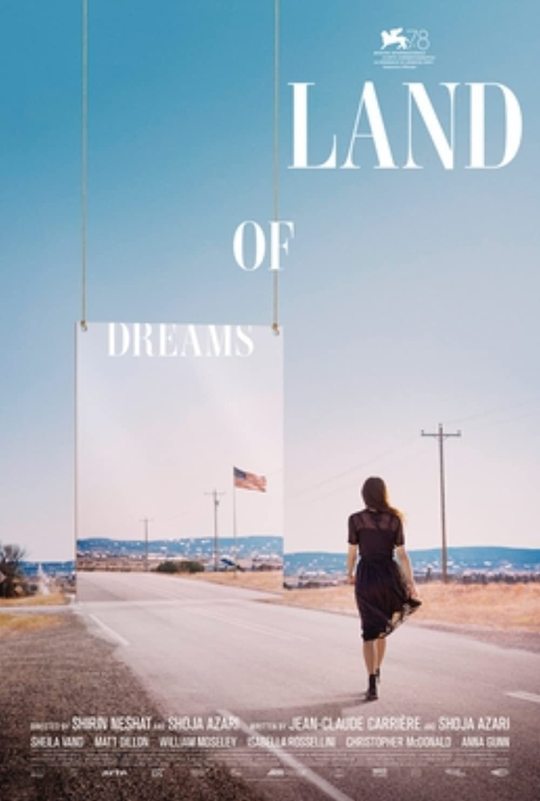

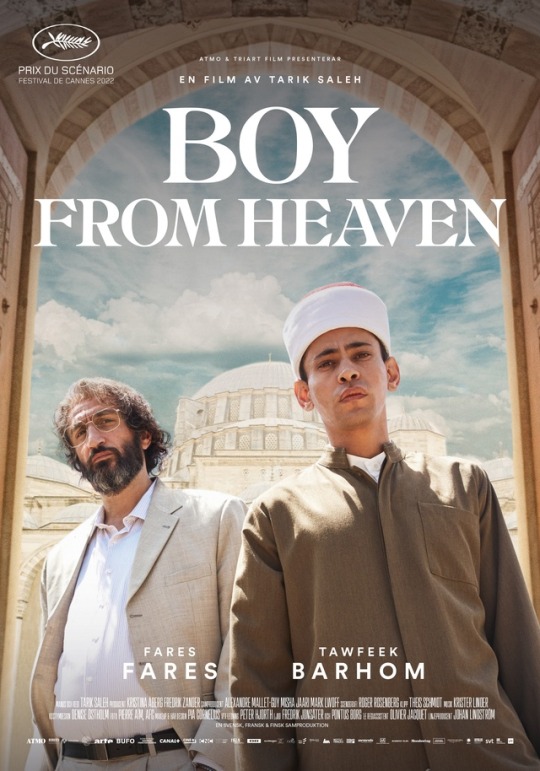

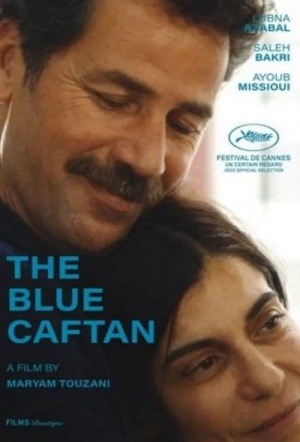
Some 2021-2022 Films by SWANA/MENA Filmmakers
Bones and All (2022). Dir. Luca Guadagnino Sirens (2022). Dir. Rita Baghdadi Burning Days (2022). Dir. Emin Alper Holy Spider (2022). Dir. Ali Abbasi Costa Brava, Lebanon (2021). Dir. Mounia Akl Land of Dreams (2021). Dir. Shoja Azari & Shirin Neshat The Swimmers (2022). Dir. Sally El Hosaini Boy From Heaven (2022). Dir. Tarik Saleh Harka (2021). Dir. Lofty Nathan The Blue Caftan (2022). Dir. Maryam Touzani
#bones and all#The Blue Caftan#the swimmers#sirens#film#burning days#Holy Spider#costa brava lebanon#land of dreams#boy from heaven#harka#algerian#jordanian#moroccan#lebanese#egyptian#iranian#turkish
483 notes
·
View notes
Photo
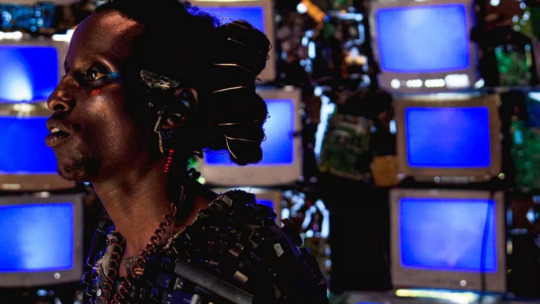
The Eyes of TIFF.
Programmers for the 46th Toronto International Film Festival chat about the degrees of intensity they look for in a festival film, and help us zoom in on the gems from TIFF’s 2021 program, by genre and region.
“Intensity can be achieved in so many different ways. I know it when I feel it. You feel it in your gut.” —Cameron Bailey
It’s almost business as usual for TIFF this year. In-person events and red carpets return, but a healthy virtual program is also available for Canadian-based folk unable to travel, as the Covid-19 pandemic continues its onslaught.
TIFF co-head and artistic director Cameron Bailey has been with the festival for just over half its life, and says while some of the technology has changed in that time—“you’re no longer sitting in front of a TV monitor with VHS tapes… or waiting for 35mm prints to be spooled up and projected for you”—the “basic process of falling in love with movies” has not.
It’s a challenge, Bailey says, to winnow down the films he falls in love with for the final TIFF lineup. And even then, it is an annual challenge for film lovers tight on time to narrow down their own selections. So, ahead of the fest, Bailey joined fellow TIFF programmers for a Twitter Spaces conversation with our editor in chief Gemma Gracewood, in order to help Letterboxd members make some watchlist decisions.
Joining Bailey were Thom Powers (TIFF Docs), Peter Kuplowsky (Midnight Madness), Robyn Citizen (senior programming manager), Diana Sanchez (Special Presentations, Spain, Latin America, Portugal and the Caribbean), Diana Cadavid (International Cinema) and Nataleah Hunter-Young (Africa, “the Middle East” and the Black Diaspora).
Edited highlights of the conversation follow, so have your watchlists close at hand.
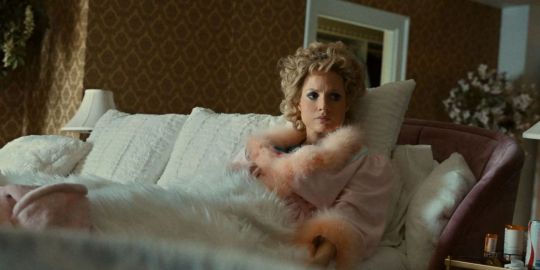
‘The Eyes of Tammy Faye’, written by Abe Sylvia and directed by Michael Showalter.
Thank you all for joining me today. You watch a lot of films as you’re going through the selection process. How does one make itself stand out to you? Cameron Bailey: For every programmer it’s going to be something different. For me, it comes down to an intangible quality of intensity. That can be emotional intensity, it can be the intensity of formal elements, the cinematography, the performances, the writing. Some sense of concentrated emotion and momentum, where you get the sense that a filmmaker is trying to find a way to distill the essence of what they’re trying to do and communicate it to an audience through all of the tools that cinema provides. That doesn’t mean the movie has to be fast-paced or have a lot of dramatic jolts, as intensity can be achieved in so many different ways. I know it when I feel it. You feel it in your gut.
What would you say are some of the performances that have struck you the most this year? CB: Jessica Chastain is the lead in a film we’re premiering called The Eyes of Tammy Faye, directed by Michael Showalter. If you were watching TV in the ’80s and ’90s, you will remember Tammy Faye Bakker, and her husband, Jim Bakker, who were TV televangelists. You couldn’t miss Tammy, as she had these giant eyes and makeup with giant eyelashes, and this is essentially her story. It’s hard to know at first that it’s Jessica Chastain underneath all of that makeup, but she gives a performance that’s not just about the exterior. It’s about a woman who is shaped by a difficult upbringing, shaped by this incredibly deep need she has for affirmation, to be on TV, to be in front of the camera, and that guides her decisions into extremes. She’s fantastic in it.
Benedict Cumberbatch is back with two films. He is the lead in Jane Campion’s The Power of the Dog. It’s an understated, slow-burn performance in some ways, which he can do so well. He’s also in a film that’s on the opposite end of the dramatic spectrum, The Electrical Life of Louis Wain. It’s based on a real person, and when you watch the film you will be amazed that this person actually existed. Wain, in the early part of the twentieth century, was a prodigious painter who turned his talent towards painting thousands of cats. Cute cats, big eyed cats, fuzzy, adorable cats. He’s largely responsible for cats becoming as big as they are as domesticated pets. It’s a wild story.
I’m still recovering from watching The Power of the Dog’s trailer earlier today, and had to promise myself that I wouldn’t take up this entire time talking about Jane Campion’s obsession with hands. The Spencer trailer dropped as well, which has a lot of buzz around it. CB: Yes, Spencer is a remarkable portrait. Some of us remember Princess Diana, some of us have watched The Crown, and so have a very recent image, but this is a completely different performance that Kristen Stewart gives. She’s remarkable in it. I think everybody’s going to want to see this film.
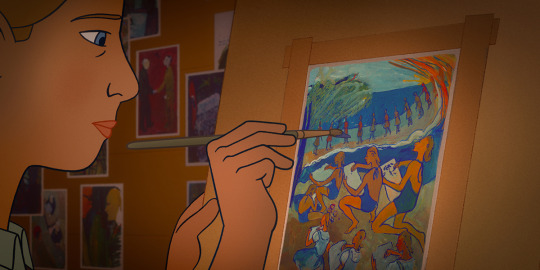
‘Charlotte’, written by David Bezmozgis and Erik Rutherford, directed by Tahir Rana and Éric Warin.
Are there any other titles you’d like to get the buzz started for, Cameron? CB: On the animation side, I would say people should look out for a film called Charlotte, by Tahir Rana and Éric Warin. It’s a Canadian film telling a story based in World War II Europe about a woman in a Jewish family [exiled] in France during the occupation of France by the Nazis. She can feel what is coming. She decides to paint everything about her life, and her family’s life, trying to document what she feels is going to be very fragile, and what she might lose altogether.
As it turns out, before the end of the war she was taken away to a death camp by the Nazi regime, and she didn’t survive, but her paintings have survived and they were turned into a book, along with the story of her family. The animation is just gorgeous. I think that’s one that awards bodies are going to be paying attention to. It’s one of the best animated films I’ve seen in quite a while.
Thom, what are some of the documentary titles that you and the team think those awards bodies will have their eyes on? Thom Powers: A big one to pay attention to is The Rescue, by Chai Vasarhelyi and Jimmy Chin, who won the Oscar for their last film, Free Solo. Their new film is looking at the Thai cave rescue [in 2018], when a group of young soccer players and their coach got trapped by monsoon floods in a cave. When we were watching the news, we were seeing the journalists reporting from outside the cave. What this film does is bring you inside that rescue using footage that’s never been seen before. Chai Vasarhelyi and Jimmy Chin are masters at the documentary adventure genre, and also [at] bringing a real human side to the people involved, which they do again here.
I’ll also mention Becoming Cousteau, by Liz Garbus, and Julia, a film about Julia Child, directed by Julie Cohen and Betsy West, who made the Oscar-nominated documentary RBG a few years ago. So many of us during the pandemic had to rediscover ourselves in the kitchen, and Julia Child’s life was about making people feel more comfortable in the kitchen, which makes it a terrific film to watch at this time.
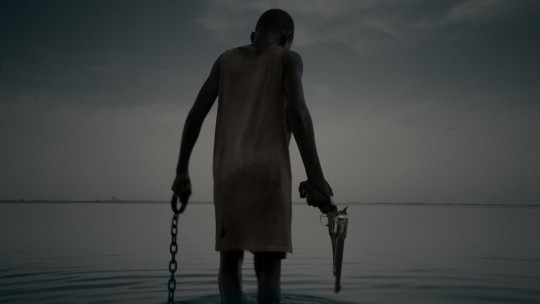
‘Saloum’, directed by Jean Luc Herbulot.
Peter, what’s a movie from this year’s Midnight Madness lineup you’d love to recommend? Peter Kuplowsky: We’ve got a lot of firsts at Midnight this year. We have Saloum, the first time a West African film has ever been in Midnight. We’ve also got Zalava, which is the first Iranian film to play in Midnight. Our opening film for Midnight Madness is Julia Ducournau’s Titane, which is playing at the Princess of Wales theater, and will be a spectacle to behold. When I’m looking for Midnight Madness, I like hearing the audience make certain noises in the room, whether that’s a gasp or screams or laughter. I feel that every note on the scale is going to be played during Titane by the audience.
Brilliant. Now, we’re going to bring in some audience questions. First up is Vincent, who says that one of their favorite films is Georges Franju’s Eyes Without a Face, and asks if there are any films in this year’s TIFF lineup you could recommend for a fan of that film? PK: I’ve really been encouraging people to check out the films I just mentioned, Zalava and Saloum, and I think Zalava especially would fit here, as it’s more of a horror-drama. It begins as something that is steeped in the supernatural, but as it escalates it becomes something of a pitch-black comedy while still maintaining a gravitas to it. I think it’s one of the most fascinating discoveries in the genre space this year.
CB: I’d also add Good Madam, by Jenna Bass, from South Africa. It is a chilling movie, with a bit of an Eyes Without a Face vibe. If you like that sort of approach to cinema, I think you’ll like that.
PK: Vengeance Is Mine, All Others Pay Cash just won the Golden Leopard at Locarno. With a title like that, this is a film that feels like it’s going to be sort of a strictly pulp crime film, but it’s so much more. It’s deeply romantic, incredibly eclectic, and beautifully shot on 16mm film. It feels like a film that was hidden away, shot in the late ���70s or early ’80s. It’s a throwback to 1980s Hong Kong action films, while also, I can’t stress this enough, being one of the most romantic films in the festival. You’ll fall in love with this relationship while it’s also working in fight sequences and magical realism.
Nataleah, what’s something you would recommend from your TIFF selections from Africa, “the Middle East” and the Black Diaspora? Nataleah Hunter-Young: One I’d highly recommend is Costa Brava, directed by Mounia Akl, from Lebanon. Even amidst what’s going on in Lebanon right now, the film offers a beautiful and engrossing portrait of a family that includes a grandmother who’s a non-actor, but has impeccable comedic timing (that travels through the subtitles if you don’t speak Arabic).
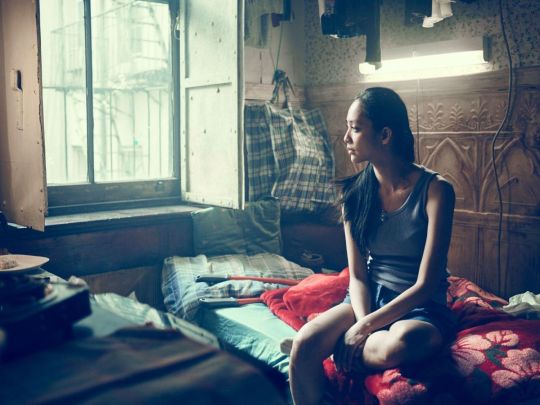
‘Snakehead’, written and directed by Evan Leong.
Robyn, what’s a movie that surprised you most during your selections this year? Robyn Citizen: I always recommend that people check out our Discovery section because that’s where we find new talent and nurture new voices. The film that really surprised me this year was Snakehead, by Evan Jackson Leong. Some people will know him from a documentary called Linsanity, and he did another documentary about evangelism in Korea. Snakehead has been a ten-year labor of love for him. He had to do a Kickstarter for the film, which is loosely based on the life of a woman named Sister Ping, who had a human trafficking ring that was the biggest trafficking ring for about 20 years.
The film tackles what’s going on now with vulnerable populations being trafficked into America, in particular Chinatown in the US, and the main character, played by Shuya Chang, has to fight to find her daughter. It’s an exciting film, and very moving. It’s extremely tightly edited, and it looks fantastic.
We’ve got our next question here from a member who says their favorite genre is science-fiction. While Dune is at the top of their watchlist, are there any other sci-fi selections you could recommend? PK: I would recommend After Blue (Dirty Paradise), which is a perverse science-fiction by Bertrand Mandico. It reminds me a lot of the French animated film Fantastic Planet. This one is about a planet which is inhospitable to men because of the way hair grows. The plot follows a young teenage girl who accidentally unleashes a notorious criminal that she and her hairdresser mother have to stalk through the alien landscape that is full of bizarre creatures and liquids and gases. I feel it’s kind of like the inverse of Dune, and an opportunity to explore a bizarre ecosystem.
NHY: I would totally insist that this member see Neptune Frost, from Saul Williams and Anisia Uzeyman. It’s a difficult film to put into words, but I’ve been summing it up by calling it an Afro-sonic sci-fi musical.
Whoa, that sounds like a whole new subgenre. NHY: That’s just the beginning. There’s a lot to experience in this film. It’s a cosmic romance that follows an intersex hacker and a coltan miner who make their way to this kind of dream space where they connect with others as they travel through these lush mountainous regions of Rwanda and Burundi. It’s a beautiful anti-narrative that is impeccably colored and totally consuming. It’s a must-see for anybody who loves cinema.
Diana, what would you say is the best debut feature that you’ve seen among this year’s international selections? Diana Cadavid: There are so many wonderful new talents, but I think I’ll go with an Argentinian filmmaker named Agustina San Martín. Her film, To Kill the Beast, is a co-production between Argentina, Brazil and Chile, and she worked for nine years to put this all together. She started working on it when she was 21, and we were actually having a conversation yesterday about her process, and how it’s a film that deals with the growth of a woman, and female desire. There’s this idea of the beast, something that’s either from inside or from outside forces, trying to control the human mind and body. It’s a very interesting film, gorgeously shot and very atmospheric.
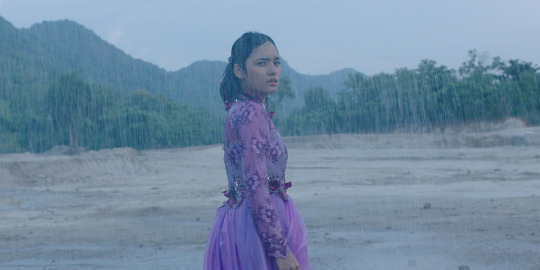
‘Yuni’, written by Prima Rusdi and Kamila Andini, directed by Andini.
We’ve got another question here from David, who says their favorite films are humanistic dramas, citing Hirokazu Kore-eda as one of their favorite directors. Would anybody have any recommendations for David? CB: I can recommend at least one film, called Yuni, an Indonesian film from Kamila Andini. This is a naturalist drama about a high-school girl who is one of the top students in her class, and has a great group of friends. We slowly begin to see that her life is being constrained by one man after another, and then something happens at school, which begins to narrow her possibilities for her future. She’s trying to figure out things like sexuality and romance and what she wants to do with her future, and all of these obstacles keep getting placed in her path. It’s told in a very gentle way, but very incisive as well. Each scene really matters, taking you deeper inside this girl’s life.
RC: Our senior programmer Giovanna Fulvi programmed a film called Aloners, a South Korean film by Hong Sung-eun. This is her first feature, and it’s very much a film of our time. It is about a woman who works in the gig economy at a credit-card customer-service call center. It’s a very transient existence. She doesn’t talk to anybody, she eats by herself, she doesn’t really want to associate with the people in her apartment building. One day, one of her neighbors who has tried to talk to her many times passes away, and she has to re-interrogate the way that she’s been living her life, and figure out if it’s worth starting to form some human connections.
Next up is a question from Matt Neglia, from the Next Best Picture podcast. Matt says that he’s a massive fan of epics, whether they’re three hours long or just telling an expansive story with lots of world-building. Apart from Dune, are there any other films in the lineup that you would describe as epic? CB: While Joachim Trier’s The Worst Person in the World might not strike you on reading its synopsis as an epic, I think it actually is an emotional epic. It’s the story of a young woman who’s trying to figure out her life. Her romance with one boyfriend doesn’t quite fit the bill for her, and she begins this looking and exploring. Trier and his writer and lead actor do remarkable work, blowing open the idea of a person trying to define who they are at this turning point in their life. They make these stakes massive and they have all kinds of interesting, innovative, formal elements in [the film] as well. It’s incredibly cinematic. If you’ve seen Joachim Trier’s other films, this is kind of the conclusion of a trilogy that he’s made.

‘Listening to Kenny G’, directed by Penny Lane.
Next up, we have Sarah, who is looking for movies about music, and also some body horror. CB: We’ve got a number of great music docs this year. I have to mention Dionne Warwick, the queen of Twitter, who is the subject of Dionne Warwick: Don’t Make Me Over. It tells the story of this incredibly talented, determined and glamorous musician who broke so many barriers. She toured in the south during the Jim Crow era, making gains as a Black woman in the music industry and in the pop-music industry, not the so-called race-record or Black-music industry, which simply wasn’t done at the time. This documentary tells that story, and also shows her later work in the ’80s contributing to the fight against stigma and hysteria during the AIDS crisis.
PK: I’ll follow up Cameron by mentioning the Alanis Morissette film Jagged. We’ve also got a film about the great jazz pianist, Oscar Peterson, called Oscar Peterson: Black + White. Lastly, there’s a film about Kenny G, called Listening to Kenny G.
Diana Sanchez: For the body horror, I’d like to mention the debut film by Ruth Paxton, titled A Banquet. It’s about a young woman who insists her body is no longer her own, and is a service to a higher power. Her mother has no idea what to think. She stops eating, and her mother doesn’t know [whether] to believe her or not. I love Ruth Paxton’s work, the way she shoots the film, the way she shoots the food. It’s almost, as she refers to it, pornographic. It looks delicious and gross all at the same time.
I’d also like to flip to comedy quickly to mention Official Competition. The film stars Penélope Cruz, Antonio Banderas and Oscar Martínez. Cruz plays a filmmaker who puts together a well-known theater actor and a well-known box-office glamor guy, played by Banderas. The film speaks to the tension between high art and more popular art, testing those boundaries. It’s incredibly funny.
We’d love to squeeze a few more films out of everyone for our watchlists. Could you each recommend one film and try to sell it in ten words or less? CB: Let me try. Sundown, by Michel Franco. Tim Roth falls apart beautifully in Mexico.
TP: I’m going to go with the Mexican documentary, Comala. Filmmaker Gian Cassini explores the legacy of his father, who was a Tijuana hitman.
PK: I’ll go with Saloum, which is basically From Dusk Till Dawn in West Africa.
RC: I’m going to say The Wheel, a movie by Steve Pink. If you like Who’s Afraid of Virginia Woolf?, this is like that with a younger couple in a much more humane, intimate key.
DS: I’ll say I’m Your Man, a sci-fi where Maren Eggert dates a robotic Dan Stevens.
PK: I know Diana has been recommending a film called OUT OF SYNC, about an artist who begins to experience the sound of the world going out of sync. She starts hearing sounds from the past because people and things are out of sync with their surroundings.
NHY: I’ll go with The Gravedigger’s Wife, directed by Khadar Ahmed. It showcases the horn of Africa unlike you’ve ever seen it on screen.
Finally, for Cameron: with fall coming, what is the best TIFF 2021 movie to watch under a blanket, either because it’s cozy or because you’re terrified, or both? CB: Great question, which gives me a chance to talk about Earwig, the new film by Lucile Hadžihalilović. If you’ve seen Innocence or Evolution, her two most recent films, you’re prepared in terms of tone, but you’ve not even seen Lucille make a film quite like this. It’s eerie, disturbing, hypnotic, mesmerizing. You can’t stop watching, but you’re always afraid that something awful and horrifying is about to happen… and maybe it might.
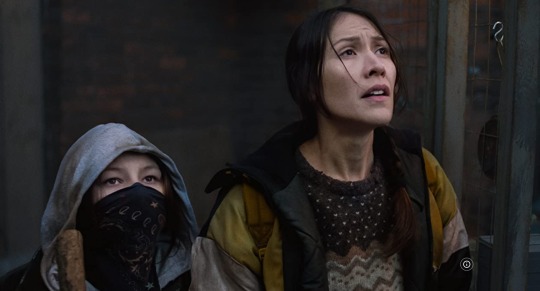
‘Night Raiders’, written and directed by Danis Goulet.
To bring it all back home, what would you say is the Canadian film of 2021? CB: It’s always hard to say, but I think in a year where we have Danis Goulet’s feature Night Raiders, that’s got to be the one. Danis has made some exceptional short films over the last few years that people might know. Her feature takes on the horrific, devastating story of residential schools and children torn from Indigenous families and put in institutions where the goal was to erase their Indigenous identity. She takes that terrible, real history that we’re grappling with right now in Canada, and turns it into a piece of speculative fiction, a kind of propulsive thriller.
By turning it into fiction rather than reality she can use all of the tools of cinema to tell a terrific story that’s exciting and has high stakes, but also has this deep resonance of a truth that we are, I hope, coming to terms with in this country.
The Toronto International Film Festival runs from September 9 to 18. This conversation has been edited for length and clarity. Follow TIFF on Letterboxd, and follow our Festiville HQ for regular festival updates.
#tiff#tiff21#tiff 21#tiff 2021#toronto#toronto international film festival#cameron bailey#midnight madness#jessica chastain#jane campion#benedict cumberbatch#saul williams#danis goulet#canadian film#letterboxd#festiville#letterboxd festiville#gemma gracewood#thom powers#nataleah hunter-young
3 notes
·
View notes
Video
vimeo
Submarine directed by Mounia Akl.
Have you explored Mounia Akl’s work?
#DirectedbyWomenStreaming
Day 30 of the #DirectedbyWomen Worldwide Film Viewing Party.. and day 150 of my #90minDirectedbyWomen yearlong film viewing practice.
0 notes
Photo
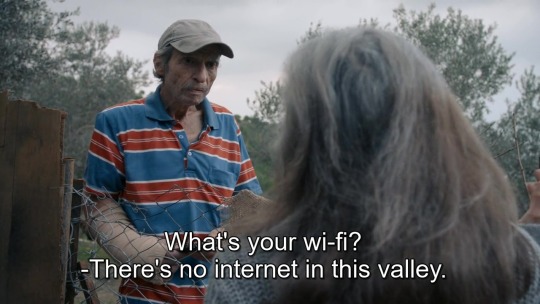
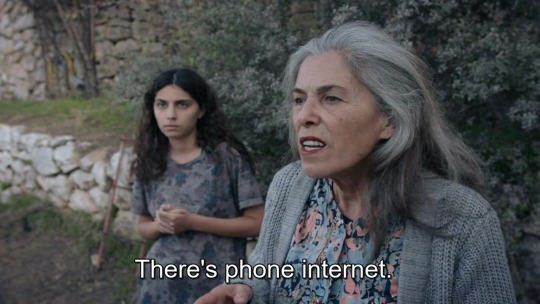

كوستا برافا، لبنان [Costa Brava, Lebanon] (Mounia Akl, 2021)
#كوستا برافا، لبنان#Mounia Akl#drama film#Clara Roquet#Beirut#Costa Brava Lebanon#Nadine Labaki#Saleh Bakri#city dump#Kūstā Brāfā Lubnān#pollution#landfill#family#grandmother#middle east cinema#harmony#parents#countryside#love#middle east societies#environment#friends#music#ecology#self-sustaining#swimming pool#rural life#teenagers#MENA#nostalgia
38 notes
·
View notes
Video
vimeo
Copland Justin Peck NYCB (dir. Mounia Akl) from Christopher Aoun on Vimeo.
0 notes
Text
Seminar 2 - Film Notes
Here are my notes for this week’s films.
how all departments can contribute to world-building and overall mise-en-scene.
the effectiveness of each department's contribution.
how well the narrative is communicated within the short form.
how well the time is used and whether the stories sustain for the duration of the film in films over 10 mins.
characters' point of view and character relations - how pre-conceived expectations and judgements can be manipulated by film-makers to inform the narrative direction and audience experience.
Submarine
(20:50)
https://vimeo.com/233685439
Interesting cuts where people change sides, breaking rules of 180 and blocking.
Worldbuilding - feels apocalyptic, gives good sense of this through character dialogue. Lots fo setup from the character reactions.
Many of us didnt know this was a true event
We didnt really get the story
Confused by time jumps in bar (wasnt actual time jumps but felt like it was)
Missing contexts due to not lviivng in lebanon during time
Is her only intent being passive rebellion? We have a character who is so passive to their surroundings, only real worry is their window and getting laid. So the idea that this person was so hardcore protesteor who got their bones broken. Interesting character who used to be a protestor and is now passive. >> someone who has given up and doesnt give a shit anymore - romanticised passivenes??
We feels you could easily half the film in terms of story, but we loved sitting with the look with the film.
Romancised that there was a whole world here, and now we’re seeing the shit end of it. And the two romantic characters had something and now it is gone - everyone is evacuating.
Is the narrative their interpersonal conflict, is it her protestor past, is it the broader idea of infrastructure collapse.
Good consistent tone through visuals. Great production design for the world. Intimate shots, then once everyone leave change to wide shots.
Feels very slice of life, realistic, despite how heightened the situation is.
Romance didnt benefit the film, but loved their chemistry.
Listen
(12:54)
https://vimeo.com/196593911
Trigger warning – ‘Listen’ deals with themes of domestic abuse, violence and racism
Hail Mary Country
(18:36)
https://vimeo.com/286448015
Felt like an amazing version of an aunty donna sketch
>> would love to see a feature of this
Felt really short, quick paced. Tension was drawn out. Setup was crazy and slightly messy
Performances were amazing
Resolution was a bit satisfying
The fact they hang dong, repectfully. It takes thr apects of sexiness, and uses them for not sexy things. Reversal of gender roles. Usual guy characters have become women.
Colour grade was sickly. Popped in certain moments.
>> costume and character design works well in sets. Look at any person in family and be able to immediately get personality. Gives sense of heightened reality.
Toned down slightly (colour grade) gives homely americana, sitcom vibes.
The Shining Star of Losers Everywhere
(18:38)
https://vimeo.com/176459945
Documentary format
Interesting animation styles to show story
Good pace fo storytelling
Music kept engaged
Use of colours!! Very clear art direction
Never left location
Animation played part in pacing, instead of showing actual horse racing - to be able to distinguish a single horse, and focus, gave sense of character.
>> doesnt show grim side of horse racing.
Good message about not having to win.
Skeleton Heart
(3:16)
https://vimeo.com/319704456
Also by Submarine director Mounia Akl, that I thought might be of interest for a couple of the more experimental ideas
Sound design didnt add much
Didnt understand the story - no skeletons
Worlds biggest ringlight
0 notes
Text
Seminar 1 & 2 Films
Submarine:
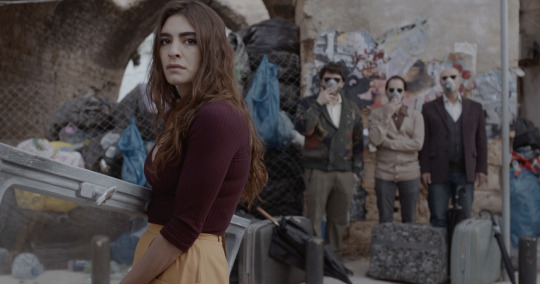
Submarine is an award-winning short film by Mounia Akl. The film centres around a woman named Hala who, amidst the 2015 Lebanon Garbage crisis, is refusing to leave.
The opening sequence in this film is an excellent demonstration of several filmmaking disciplines working together. As the camera pans around Hala’s home, it is clear from the production design this is the home of a person who is artistic and sentimental. The living room is covered in keepsakes, family photos, film and music posters; the place is warm and inviting. Due to the immersiveness of the production design, the slow pan at the beginning feels warranted as it gives the audience time to take a look at Hala’s home. The warmth built in these opening few shots is disrupted as her window buckles under the pressure of the mounting rubbish, and the harsh light of reality streams through her broken window. Cinematography and production design work together to create a striking image and establish the journey the character must go on.
After this moment is where the film gets on to some uneasy ground. In terms of whether the 20-minute run of the film is warranted, I think it is. The filmmaker might indulge a little bit in the Cinemagic vistas of the landscapes, but I think cutting the runtime down would affect the passing and effect of what the filmmaker is ultimately trying to achieve. What I think doesn’t work are some of the story elements. Hala is somewhat passive, and I didn’t really believe in the romantic narrative or why she felt so strongly that she had to stay. I could pick up from context clues that perhaps she wants to stay to be close to her late father as her home town is her last connection to him. However, this is not clearly stated, and I think, overall, the narrative is a bit too unambiguous. I read a review by Vladan Petković, who argued that the film felt like a preview of something much bigger. They had quite a strong opinion about filmmakers using short films in this way as the format should be self-contained; they shouldn’t be used as a trailer for a feature. I have to agree with why I think the film is the way it is. Mounia Akl is giving her audience a taste of the theme and character she wants to explore in more detail and leaves you with more questions than answers to gain momentum toward a more significant project.
Hail Mary Country:
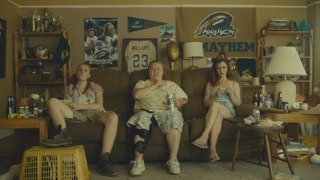
This 2018 short film, directed by Tannaz Hazemi, is about an American football-loving family held at gunpoint by an unsuspecting house guest.
This is an interesting film and one which divided opinion among the class. For me, the film didn't work. From the get-go, the film felt as though it wanted to play with conventions and, at every opportunity, play with audience expectations. Whether it's the women who are obsessed with a football whilst the men are in the kitchen or having the male figures objectified whilst washing the car or the tv being the point of tension rather than the loss of a daughter. It felt too much, and after a strong first act, characters and plot points fell to the way side. For example, we are introduced to Darla as the protagonist; however, once she has stolen the car, the narrative shifts to the conflict between Nora and Irene. Therefore, the story doesn't sustain through its 18-minute run time and feels like a film of two halves.
However, the film does work in terms of production design and sound. In the opening shots of the family, we understand their passion for American football. Their living room is adorned with memorabilia; one of the daughters is taking bets, the dad is baking a celebration cake, and the family are watching old games before the big match at five. We also immediately understand the class dynamics of the family; it is clear that this family is a stereotypical working-class southern American family through the way they dress, mannerisms and family dynamics. Additionally, the sound design is used expertly, especially to explain the character's backstory. For example, whilst Darla is washing the car, we hear race car sounds; this, combined with the finishing flag necklace she wears, leads the audience to deduce that previously Darla has raced cars. Therefore, these filmic elements motivate Darla to steal the car without the need for unnecessary exposition.
This film works on serval fronts, including production design and sound, but I think the main issue with this film is the writing. There is no clear protagonist, and for me, the quirky tension about the tv doesn't work and loses focus.
Strange Men:

Strange Men is a 2013 short by Andrew Fitzgerald about a penniless young drifter who decides to travel back home. But on her journey, she encounters several strange men, including one who claims to be her father.
The film's first half works well to comment on the pevertated male gaze as Abby travels through America. The editing and camera work together to capture the solo female travel experience. Whilst traving, women tend to be more warry of those who occupy the world around them to be prepared to protect themselves against strange men. This sentiment is particularly well communicated in the train sation scene. As Abby is waiting, her eyes constantly scan her surroundings, and the camera lingers on those passing, surveying for potential threats. The editing reienforces this setiment as people are continually crisscrossing across the frame to represent this heightened state of awareness.
However, the film begins to lose itself with the introduction of Abby's father, Tim. Their conversation is overly long, rambling and inconsequential. Through this conversation, I think the filmmakers were trying to show Tim trying to find common ground with Abby to bond. The way Tim goes about it is unsettling; whether this was the filmmaker's intention to maintain this perveted male guess I am unsure of, but the writing of this scene is not strong enough to carry through any sentiment effectively enough.
Overall:
I liked all the films across seminars 1 and 2. However, in terms of my filmmaking, this term, the production design in Submarine was particularly significant. In Moth Lilith's film, a lot of the action will occur in the protagonist's bedroom. And similarly to Hala's apartment at the beginning of the Submarine, we want our protagonist Sophia's bedroom to be equally representative of her personality, to have a richness to the production design to give the space depth.
0 notes
Photo

Friday Releases for July 15
Friday is the busiest day of the week for new releases, so we've decided to collect them all in one place. Friday Releases for July 15 include The Rehearsal, Where The Crawdads Sing, Hip Hop 50, Vol. 1, and more.
Where The Crawdads Sing
Where The Crawdads Sing, the new movie from Olivia Newman, is out today.
From the best-selling novel comes a captivating mystery. Where the Crawdads Sing tells the story of Kya, an abandoned girl who raised herself to adulthood in the dangerous marshlands of North Carolina. For years, rumors of the “Marsh Girl” haunted Barkley Cove, isolating the sharp and resilient Kya from her community. Drawn to two young men from town, Kya opens herself to a new and startling world; but when one of them is found dead, she is immediately cast by the community as the main suspect. As the case unfolds, the verdict as to what actually happened becomes increasingly unclear, threatening to reveal the many secrets that lay within the marsh.
Paws of Fury: The Legend of Hank
Paws of Fury: The Legend of Hank, the new movie from Chris Bailey, Mark Koetsier, and Rob Minkoff, is out today.
A hard-on-his-luck hound Hank (Michael Cera) finds himself in a town full of cats who need a hero to defend them from a ruthless villain’s (Ricky Gervais) evil plot to wipe their village off the map. With help from a reluctant teacher (Samuel L. Jackson) to train him, our underdog must assume the role of town samurai and team up with the villagers to save the day. The only problem… cats hate dogs!
The Deer King
The Deer King, the new movie from Masashi Ando and Masayuki Miyaji, is out today.
In the aftermath of a brutal war, former soldier Van toils in a mine controlled by the ruling empire. One day, his solitary existence is upended when a pack of wild dogs carrying a deadly and incurable disease attack, leaving only Van and a young girl named Yuna as survivors. Finally free, the pair seek out a simple existence in the countryside but are pursued by nefarious forces. Intent on protecting Yuna at all costs, Van must uncover the true cause of the plague ravaging the kingdom—and its possible cure.
She Will
She Will, the new movie from Charlotte Colbert, is out today.
An aging film star retreats to the Scottish countryside with her nurse to recover from surgery. While there, mysterious forces of revenge emerge from the land where witches were burned.
Don’t Make Me Go
Don’t Make Me Go, the new movie from Hannah Marks, is out today.
When single father Max (John Cho) discovers he has a terminal disease, he decides to try and cram all the years of love and support he will miss with his teenage daughter Wally (Mia Isaac) into the time he has left with her. With the promise of long-awaited driving lessons, he convinces Wally to accompany him on a road trip from California to New Orleans for his 20th college reunion, where he secretly hopes to reunite her with her mother who left them long ago.
Persuasion
Persuasion, the new movie from Carrie Cracknell, is out today.
Living with her snobby family on the brink of bankruptcy, Anne Elliot is an unconforming woman with modern sensibilities. When Frederick Wentworth—the dashing one she once sent away—crashes back into her life, Anne must choose between putting the past behind her or listening to her heart when it comes to second chances.
Gone in the Night
Gone in the Night, the new movie from Eli Horowitz, is out today.
When Kath and her boyfriend arrive at a remote cabin in the redwoods, they find a mysterious young couple already there. But when her boyfriend disappears with the young woman, Kath becomes obsessed with finding an explanation.
Costa Brava, Lebanon
Costa Brava Lebanon, the new movie from Mounia Akl, is out today.
Costa Brava, Lebanon captures the joys and frustrations of a close-knit family with an intimacy that feels startlingly natural, and sets them against a sharply drawn backdrop of environmental crisis. In the not-so-distant future, the free-spirited Badri family have escaped the toxic pollution and social unrest of Beirut by seeking refuge in an idyllic mountain home. Without warning, the government starts to build a garbage landfill right outside their fence, intruding on their domestic utopia and bringing the trash and corruption of a whole country to their doorstep. As the landfill rises, so does tension in the household, revealing a long-simmering division between those family members who wish to defend or abandon the mountain oasis they have built.
Karmalink
Karmalink, the new movie from Jake Wachtel, is out today.
In near-future Phnom Penh, the rich and privileged are augmented with nanotech, and new skyscrapers crowd the skyline. In Tralop Bek, a tight-knit community threatened with forced eviction, 13 year-old Leng Heng is having vivid dreams of his past lives. He and his friends are convinced they are meant to find a buried Buddhist statue to save their homes, and they seek out help from a street-smart girl in the neighborhood, Srey Leak. Together they follow clues across town and into the past. As Leng Heng’s dreams converge on the present, his very sense of identity begins to unravel. When it becomes clear that the stakes are higher than they imagined, the two friends must decide how far they are willing to go to find their treasure and the truth.
The Rehearsal
The Rehearsal, the new TV series from Nathan Fielder, is out today.
Nathan Fielder returns to television for a new series that explores the lengths one man will go to reduce the uncertainties of everyday life. With a construction crew, a legion of actors, and seemingly unlimited resources, Fielder allows ordinary people to prepare for life’s biggest moments by “rehearsing” them in carefully crafted simulations of his own design. When a single misstep could shatter your entire world, why leave life to chance?
Hip Hop 50, Vol. 1
Hip Hop 50, Vol. 1, the new EP from DJ Premier, is out today.
0 notes
